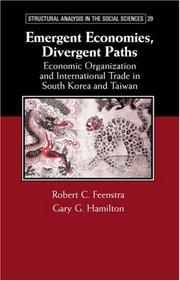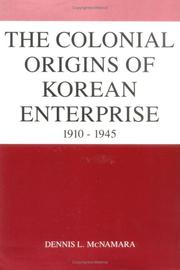| Listing 1 - 3 of 3 |
Sort by
|

ISBN: 0521622093 9780521622097 9780511499586 9781107634510 0511168918 9780511168918 0511166389 9780511166389 0511167970 9780511167973 0511168489 9780511168482 0511499582 1107142423 1280436840 0511167423 0511312318 1107634512 Year: 2006 Publisher: New York : Cambridge University Press,
Abstract | Keywords | Export | Availability | Bookmark
 Loading...
Loading...Choose an application
- Reference Manager
- EndNote
- RefWorks (Direct export to RefWorks)
The economies of South Korea and Taiwan in the second half of the twentieth century are to scholars of economic development what the economy of Britain in the late eighteenth and early nineteeth centuries is to economic historians. This book, first published in 2006, is a collaboration between a leading trade economist and a leading economic sociologist specializing in East Asia, and offers an explanation of the development paths of post-World War II Korea and Taiwan. The ambitions of the authors go beyond this, however. They use these cases to reshape the way economists, sociologists, and political scientists will think about economic organization in the future. They offer nothing less than a theory of, and extended evidence for, how capitalist economies become organized. One of the principal empirical findings is that a primary cause for the industrialization of East Asia is the retail revolution in the United States and the demand-responsiveness of Asian manufacturers.
Korea (South) --- Taiwan --- Economic conditions. --- Economic conditions --- Commerce. --- K9400.80 --- K9410 --- K9460 --- S26/0750 --- Korea: Economy and industry -- history -- modern period, postwar period (1945- ) --- Korea: Economy and industry -- organization and systems --- Korea: International trade and economic relations (South) Korea -- world and transregional --- Taiwan--International economic relations and trade --- Economic history. --- History, Economic --- Economics --- Social Sciences --- Sociology

ISBN: 0521385652 0521032083 0511528108 Year: 1990 Publisher: Cambridge [England] New York Sydney Cambridge University Press
Abstract | Keywords | Export | Availability | Bookmark
 Loading...
Loading...Choose an application
- Reference Manager
- EndNote
- RefWorks (Direct export to RefWorks)
South Korean conglomerates, or 'chaebol,' such as Hyundai and Samsung, play a far more important role in the Korean economy than do comparable large firms in the US and Japanese economies. Despite the importance of the chaebol to the rapid postwar development of the Korean economy, little has been written about their origins during the Japanese occupation. Through case studies of local ownership in major financial, commercial, and industrial ventures, this book provides a detailed picture of indigenous capitalism during Japanese colonization. Drawing on Japanese government sources, Korean biographies and diaries, interviews and US intelligence material, the author gives a compelling account of key personalities in the Korean business elite and of the personal dilemmas of balancing nationalism against success under dependent, colonial conditions. The author concludes that dependent rather than comprador capitalism characterized leading Korean businesses through 1945. Patterns of concentration within family enterprises, close ties with the colonial state, and mutual support among a Korean inner circle of business leaders constitute a legacy of the colonial period important to the subsequent development of Korean conglomerates.
History of Asia --- anno 1900-1999 --- South Korea --- Corporations --- -K9400.70 --- K9410 --- K9170 --- Business corporations --- C corporations --- Corporations, Business --- Corporations, Public --- Limited companies --- Publicly held corporations --- Publicly traded corporations --- Public limited companies --- Stock corporations --- Subchapter C corporations --- Business enterprises --- Corporate power --- Disincorporation --- Stocks --- Trusts, Industrial --- History --- -Korea: Economy and industry -- history -- Japanese annexation period (1905-1945) --- Korea: Economy and industry -- organization and systems --- Korea: History -- Japanese annexation period (1905-1945) --- Korea --- Economic conditions --- -History --- -Corporations --- -History of Asia --- K9400.70 --- Korea: Economy and industry -- history -- Japanese annexation period (1905-1945) --- Japan --- Korea [South ] --- 20th century --- 1910-1945 --- Japanese occupation, 1910-1945 --- Corporations - Korea (South) - History - 20th century. --- Korea - Economic conditions - 1910-1945. --- Korea - History - Japanese occupation, 1910-1945. --- Social Sciences --- Political Science
Book
ISBN: 9781780687131 1780687133 9781780688404 1780688407 Year: 2019 Publisher: Cambridge Antwerp Chicago Intersentia
Abstract | Keywords | Export | Availability | Bookmark
 Loading...
Loading...Choose an application
- Reference Manager
- EndNote
- RefWorks (Direct export to RefWorks)
This book brings together foreign investment and investment arbitration in Asia, the fastest growing economic region in the world. It provides a critical analysis of foreign investment, its benefits and the legal regimes of the jurisdictions studied at a time when investor-state disputes are on the rise and investment arbitration is under growing scrutiny. Governments are under greater pressure to balance the promotion of investment with public policy development and interests and calls for a permanent court for investment arbitration are getting louder. To assess future possibilities, this book takes stock of, brings together and analyses the legal regimes on foreign investment in 12 major Asian jurisdictions, namely China, Hong-Kong, India, Indonesia, Japan, South Korea, Malaysia, Myanmar, Philippines, Singapore, Thailand and Vietnam. These constitute paradigmatic examples of what is happening in the legal framework of Asian foreign investment and the impact that the current system of investment arbitration has in all of them. The analysis shows the existence of changing positions and degrees of openness towards foreign investment in the region, as well as a distinct level of exposure to and involvement in investment arbitration. Predictably, their situation will change in the near future, at least in relation to investment arbitration. Proposals for reform have already been made and international institutions are working on the development of an alternative to the proceedings of investment arbitration as it is currently constructed and understood. Consequently, the last two chapters of this book are devoted to the analysis of these developments that will most probably affect the existing situation in the region.
Internationale financiën --- Vreedzame regeling internationale geschillen --- Economisch recht --- Azië --- Investissements étrangers --- Arbitrage (droit) --- Arbitrage commercial international --- Droit --- J4540 --- J4414 --- J4750 --- Japan: Economy and industry -- commerce and trade -- international trade, economic relations and policy --- Japan: Economy and industry -- industrial organization and relations -- mergers and acquisitions, industrial finance --- Japan: Law and jurisprudence -- commercial law --- International finance --- Peaceful settlement of international disputes --- Economic law --- Asia --- Investments [Foreign ] --- International centre for settlement of investment disputes --- Investments, Foreign (International law) --- Arbitration (International law) --- K9460 --- K9410 --- K9582 --- Korea: International trade and economic relations (South) Korea -- world and transregional --- Korea: Economy and industry -- organization and systems --- Korea: Law and jurisprudence -- specific topics --- Investments --- Investissements --- Investissements étrangers (Droit international) --- Arbitrage international --- Investments, Foreign --- Arbitration agreements, Commercial --- Arbitration clauses, Commercial --- Commercial arbitration agreements --- Compromise (Arbitration agreement) --- Submission (Arbitration agreement) --- Arbitration and award --- Law and legislation
| Listing 1 - 3 of 3 |
Sort by
|

 Search
Search Feedback
Feedback About UniCat
About UniCat  Help
Help News
News